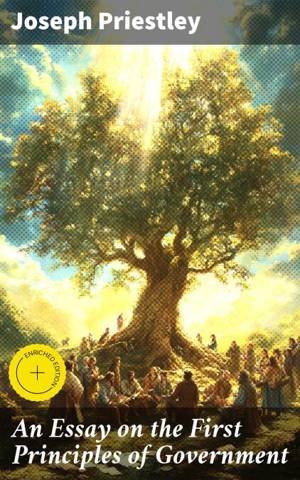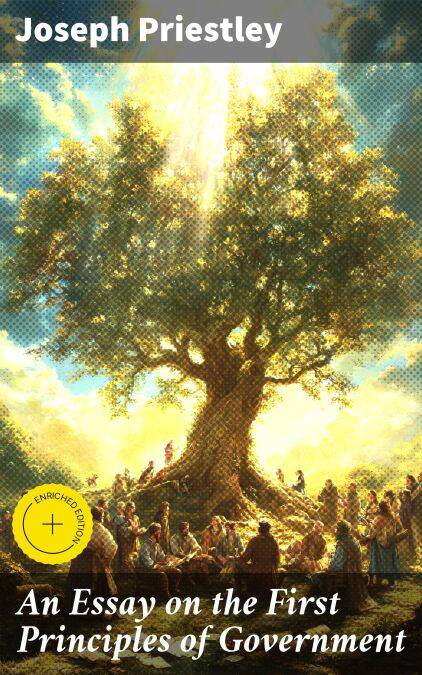
Bedankt voor het vertrouwen het afgelopen jaar! Om jou te bedanken bieden we GRATIS verzending (in België) aan op alles gedurende de hele maand januari.
- Afhalen na 1 uur in een winkel met voorraad
- In januari gratis thuislevering in België
- Ruim aanbod met 7 miljoen producten
Bedankt voor het vertrouwen het afgelopen jaar! Om jou te bedanken bieden we GRATIS verzending (in België) aan op alles gedurende de hele maand januari.
- Afhalen na 1 uur in een winkel met voorraad
- In januari gratis thuislevering in België
- Ruim aanbod met 7 miljoen producten
Zoeken
An Essay on the First Principles of Government E-BOOK
Enriched edition. Exploring the Philosophical Foundations of Governance in the Enlightenment Era
Joseph Priestley
E-book | Engels
€ 1,99
+ 1 punten
Uitvoering
Omschrijving
In "An Essay on the First Principles of Government," Joseph Priestley engages in a profound exploration of political philosophy, articulating the foundational elements that underpin legitimate governance. Written in the late 18th century, amidst the Enlightenment's fervor for reason and individual rights, Priestley's work promotes a rational discourse on democracy and represents a reaction against tyranny. Employing an accessible style interwoven with rigorous argumentation, he asserts that the primary purpose of government is to secure the greatest possible happiness for its citizenry, advocating for a model rooted in both ethical principles and the consent of the governed. Joseph Priestley, an eminent scientist and theologian, was deeply influenced by the sociopolitical dynamics of his time, including the American and French Revolutions. His background in natural philosophy and commitment to Enlightenment ideals informed his perspective on governance, prompting him to challenge established authorities and provide a framework for a more egalitarian political order. Priestley's diverse scholarly pursuits, ranging from chemistry to theology, enabled him to approach the subject with a unique interdisciplinary lens. This seminal work is essential reading for scholars of political theory and history alike. Priestley's insights resonate powerfully in today's climate of governance debates and can guide contemporary discussions on democratic principles. Readers will find that his rigorous argumentation and unwavering commitment to human rights make this essay not only relevant but invaluable.
In this enriched edition, we have carefully created added value for your reading experience:
- A succinct Introduction situates the work's timeless appeal and themes.
- The Synopsis outlines the central plot, highlighting key developments without spoiling critical twists.
- A detailed Historical Context immerses you in the era's events and influences that shaped the writing.
- An Author Biography reveals milestones in the author's life, illuminating the personal insights behind the text.
- A thorough Analysis dissects symbols, motifs, and character arcs to unearth underlying meanings.
- Reflection questions prompt you to engage personally with the work's messages, connecting them to modern life.
- Hand‐picked Memorable Quotes shine a spotlight on moments of literary brilliance.
- Interactive footnotes clarify unusual references, historical allusions, and archaic phrases for an effortless, more informed read.
In this enriched edition, we have carefully created added value for your reading experience:
- A succinct Introduction situates the work's timeless appeal and themes.
- The Synopsis outlines the central plot, highlighting key developments without spoiling critical twists.
- A detailed Historical Context immerses you in the era's events and influences that shaped the writing.
- An Author Biography reveals milestones in the author's life, illuminating the personal insights behind the text.
- A thorough Analysis dissects symbols, motifs, and character arcs to unearth underlying meanings.
- Reflection questions prompt you to engage personally with the work's messages, connecting them to modern life.
- Hand‐picked Memorable Quotes shine a spotlight on moments of literary brilliance.
- Interactive footnotes clarify unusual references, historical allusions, and archaic phrases for an effortless, more informed read.
Specificaties
Betrokkenen
- Auteur(s):
- Uitgeverij:
Inhoud
- Aantal bladzijden:
- 130
- Taal:
- Engels
Eigenschappen
- Productcode (EAN):
- 4064066443269
- Verschijningsdatum:
- 10/04/2021
- Uitvoering:
- E-book
- Beveiligd met:
- Digital watermarking
- Formaat:
- ePub

Alleen bij Standaard Boekhandel
+ 1 punten op je klantenkaart van Standaard Boekhandel
Beoordelingen
We publiceren alleen reviews die voldoen aan de voorwaarden voor reviews. Bekijk onze voorwaarden voor reviews.









